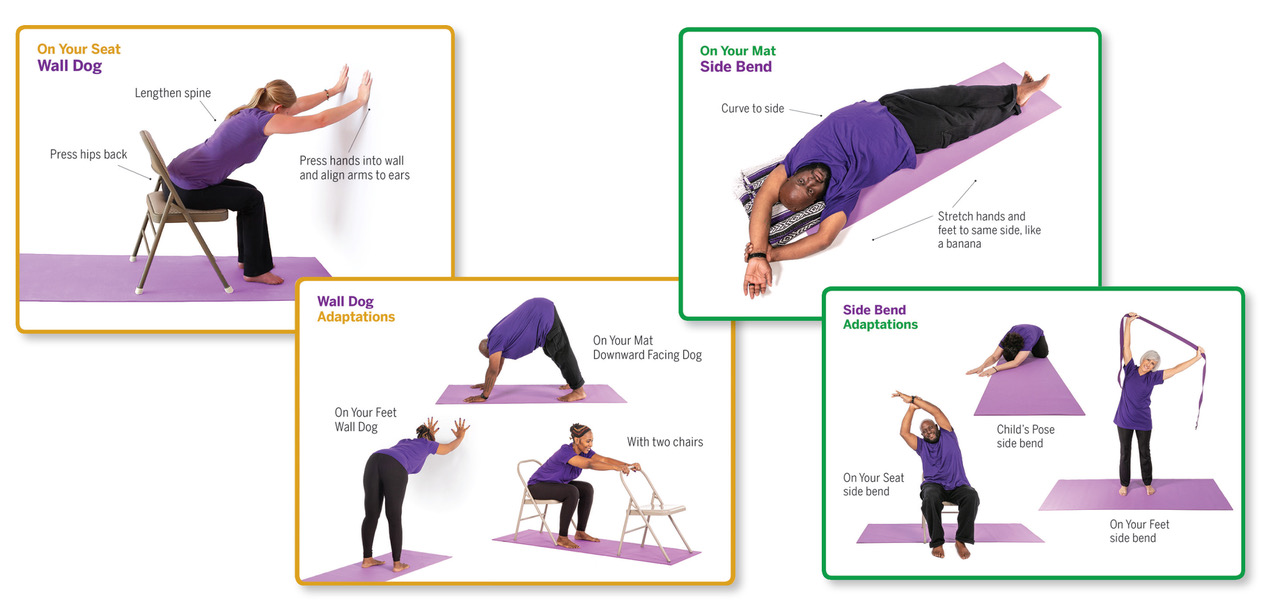On Your Seat, Feet or Mat - Adaptive Yoga
Personalized Yoga Practice Through Adaptive Yoga Cards
Integrating yoga into your daily wellness routine helps to nourish your mind, body and spirit. Adaptive yoga cards are designed to empower you to create and personalize your yoga practice anywhere and anytime. Whether you are standing, sitting, or reclining during a yoga practice, or in similar positions throughout your day - waiting in line, in the kitchen or in bed - you can create a practice just right for you.
When you begin your yoga practice, allow these important points to guide you:
• Prioritize safety
• Respect and honor your body
• Express gratitude at the beginning or conclusion of your practice
• Cultivate your own healing power with a sense of playfulness
• Focus on physical sensation and mindfully experience the pose
How to use Adaptive Yoga cards:
Adaptions expand the accessibility of a pose to fit any body. Adapt poses with props such as yoga straps, block, blankets, and bolsters, to make them more accessible. No pose is better or worse. Choose adaptions that are appropriate for your body. Use photos and cues on cards to find optimal safe alignment.
Cards are color coded:
Blue cards show poses On Your Feet
Yellow cards show poses On Your Seat
Green Cards show poses On Your Mat
The front of a pose card depicts one example of a yoga pose with arrows that point to important actions with simple cues. The back of a card shows 2-4 adaptions of the pose that have a similar primary purpose.
Build your practice mindfully:
A daily practice is desirable. Ask, "What does my body feel and need now?" It may be a breath practice, meditation, a few poses, or a combination. Consider the time available for your practice, your intention and your energy level.

What is Adaptive Yoga?:
Yoga is an art and science that connects the mind, body, and spirit through the practice of physical postures (asana), partnered with the breath (pranayama), and meditation practices. Adaptive yoga modifies these postures for persons with MS and other neuromuscular conditions.
Yoga is not a one-size fit’s all philosophy. Since every body is unique, and each individual’s practice in different, essentially all yoga is adaptive to some extent. With adaptive yoga, traditional poses are tailored to the physical body, rather than fitting and forcing the body into a particular pose and shape. Coupled with breathing , props such as blankets, chairs, yoga straps, and blocks to meet the unique needs of individuals with different abilities. Yoga poses can be adapted to be practiced in a chair, while standing, or on the earth.
With Multiple Sclerosis, the immune system attacks the Central Nervous System (CNS), and communication to and from the brain and body is compromised.
Damage to nerve fibers and the myelin sheath that protects the nerves leads to a myriad of symptoms. They include, but are not limited to, significant fatigue, muscle weakness, pain, numbness and tingling, spasticity, and challenges to balance, walking, vision, bladder, bowel, speech, swallowing, hearing, and sexual functioning. These same symptoms often manifest in other neuromuscular conditions.
We have seen how hundreds of Yoga Moves students, with varying ranges of physical and cognitive ability, and persons with similar neuromuscular symptoms can reap the rewards from adaptive yoga. Though the majority of our students have MS, others with similar neuromuscular conditions also have benefited when we apply the same principles.
Why do yoga?:
Yoga has the potential to lessen several physical symptoms of MS and other similar neuromuscular conditions. While it is not a cure, the multiplicity of benefits individuals may experience from a given pose are extraordinary: improved strength, flexibility, posture, balance, focus, circulation, digestion, elimination, pelvic floor health and decreased tension, fatigue, spasticity and other aches and pains and overall coping skills to contend with symptoms.
With breathing and posture practice, energy flows more freely through the body. A strong mind body connection results in a deeper sense of inner awareness and expression of peace, which translates to great healing. Rather than defined by a condition or disease, Yoga Moves students feel more at ease, whole, and in touch with their minds and bodies.
A common misconception is that you have to be flexible before beginning yoga. Yoga Moves MS seeks to empower any body, whether flexible or stiff, short or tall, muscular or lean, able to ambulate with or without a cane, walker or wheelchair, to heal through the power and play of yoga.
Adaptive Yoga cards complement Adaptive Yoga Moves Any Body book and videos. Learn more at yogamovesms.org.
Proceeds go to Yoga Moves MS, a non-profit, 501(c)(3) organization dedicated to providing therapeutic yoga for individuals with neuromuscular conditions. Mindy Eisenberg, MHSA, E-RYT 500, C-IAYT, is the founder of Yoga Moves MS, and has provided yoga therapy to individuals with mobility challenges for over 15 years. She is the author of Adaptive Yoga Moves Any Body. Her students are her greatest teachers and are the smiling faces on these cards.
Photos by Elayne Gross Photography
71037